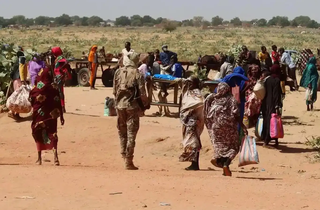Speaking on behalf of UN Secretary-General António Guterres, associate spokesperson Florencia Soto Nino-Martinez highlighted the severe impact of the fighting on the civilian population.
The Office for the Coordination of Humanitarian Affairs (OCHA) has voiced significant concern for the well-being and safety of civilians trapped in the heavy clashes in El-Fasher. The International Organization for Migration (IOM) reported that approximately 130,000 people have been displaced by the violence in and around the city over the past two months. Additionally, UNICEF has raised alarms over the battles for control of the Golo water reservoir, which threatens to cut off safe water access for about 270,000 people in El-Fasher and nearby areas.
UNICEF has called on all parties to respect international humanitarian law and halt attacks on critical civilian infrastructure, including water systems, hospitals, health centers, and schools.
Soto Nino-Martinez further emphasized the troubling findings from a recent analysis by nutrition partners, which indicate a critical situation for children and mothers across Sudan. As of March, an estimated 3.7 million children under the age of five and 1.2 million pregnant and breastfeeding women are acutely malnourished.
Despite the urgent needs, this year’s Humanitarian Response Plan for Sudan remains severely underfunded. Out of the required $2.7 billion, only $430 million, or 16 percent, has been received to date. Nonetheless, humanitarian partners continue their efforts to provide aid amid ongoing challenges, including active fighting, insecurity, looting, and access restrictions.
Martin Griffiths, the Under-Secretary-General for Humanitarian Affairs and Emergency Relief Coordinator, addressed the media at UN Headquarters, expressing deep concern over the lack of progress in ending the conflict in Sudan. He noted the risk to 800,000 civilians in Al-Fasher and mentioned his conversation with Ramtane Lamamra, the Personal Envoy of the Secretary-General, who has promising plans for moving forward.
Griffiths highlighted the worsening humanitarian situation in Sudan, with projections indicating that up to 5 million Sudanese people could be at risk of famine in the coming weeks. He lamented that the conflict, which was avoidable, has led to such a devastating scenario.
“We are not winning on ending conflicts,” Griffiths remarked, stressing the urgent need for a resolution to prevent further humanitarian catastrophe. (ILKHA)



 Güncel
Güncel
 Dünya
Dünya
 Güncel
Güncel
 Güncel
Güncel
 Güncel
Güncel
 Dünya
Dünya
 Dünya
Dünya
 Dünya
Dünya
 Güncel
Güncel
 Güncel
Güncel





